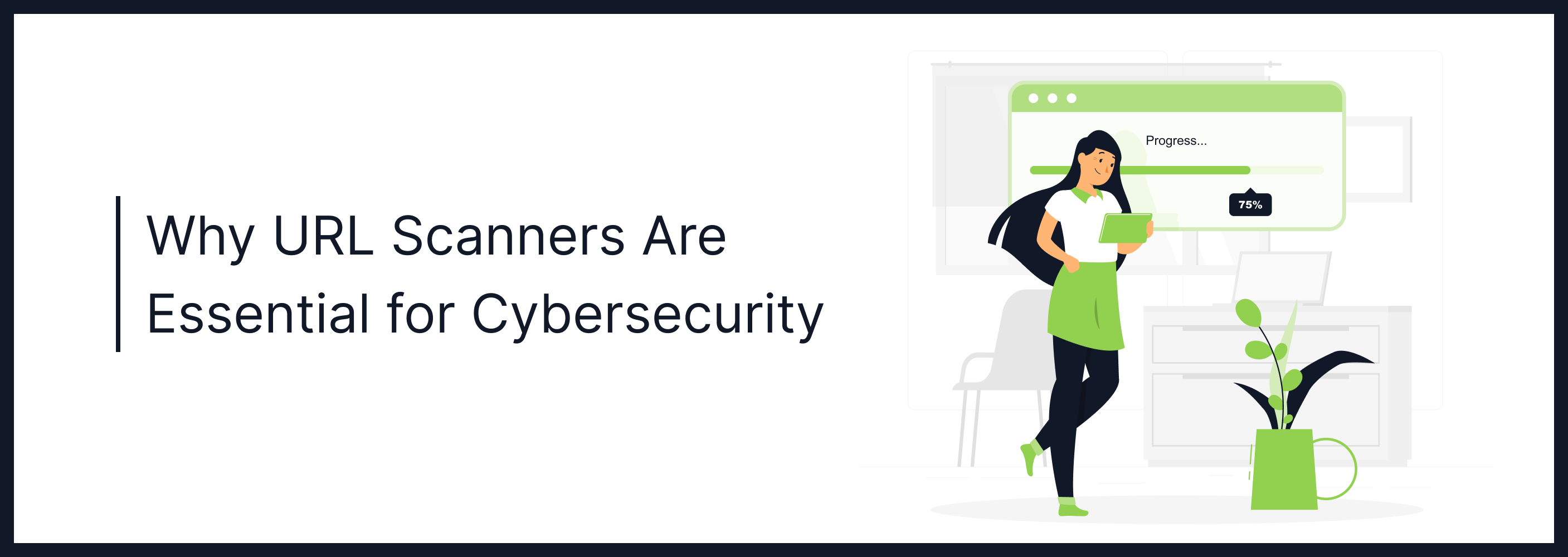
Oct 15, 2024 Information hub
Why URL Scanners Are Essential for Cybersecurity in the Digital Age
In today’s digital age, the internet is both a blessing and a curse. While it offers endless opportunities for communication, commerce, and entertainment, it also presents significant risks. Cybercriminals are constantly evolving their tactics, and one of the most common methods they use to spread malware, phishing attacks, and other malicious activities is through URLs. Whether you’re a business owner, IT professional, or just an everyday internet user, the need to protect yourself from harmful links has never been more critical. This is where URL scanners come into play.
A URL scanner is a tool designed to analyze URLs (Uniform Resource Locators) for potential threats. These scanners can detect malicious websites, phishing attempts, and other harmful content before you even click on a link. In this comprehensive guide, we’ll explore what URL scanners are, how they work, their relevance in today’s cybersecurity landscape, and why they are essential for both individuals and businesses.
What is a URL Scanner?
A URL scanner is a software tool or online service that checks the safety of a URL by analyzing its content, structure, and behavior. The primary goal of a URL scanner is to detect and block malicious websites, phishing attempts, and other harmful activities that could compromise your data or system.
How Does a URL Scanner Work?
URL scanners typically work by comparing the URL against a database of known malicious websites or by analyzing the behavior of the website in real-time. Here’s a breakdown of how most URL scanners operate:
- Database Comparison: The scanner checks the URL against a list of known malicious websites, phishing domains, or blacklisted URLs. If the URL matches any entry in the database, it is flagged as unsafe.
- Behavioral Analysis: Some advanced URL scanners go beyond simple database checks. They analyze the behavior of the website in real-time, looking for suspicious activities such as unauthorized downloads, redirects, or attempts to collect sensitive information.
- Content Analysis: The scanner may also analyze the content of the website, checking for malicious scripts, hidden iframes, or other harmful elements embedded in the page.
- Reputation Scoring: Many URL scanners assign a reputation score to websites based on their history, domain age, and user feedback. Websites with low reputation scores are flagged as potentially dangerous.
Why Are URL Scanners Important Today?
The Growing Threat of Cybercrime
Cybercrime is on the rise, and malicious URLs are one of the most common vectors for attacks. According to a report by Symantec, phishing attacks increased by 46% in 2021, with many of these attacks being delivered through malicious URLs. Additionally, Verizon’s 2022 Data Breach Investigations Report found that 36% of data breaches involved phishing, often initiated through harmful links.
Increased Use of Phishing and Social Engineering
Phishing attacks, where cybercriminals trick users into providing sensitive information by posing as legitimate entities, often rely on malicious URLs. These URLs may appear to be from trusted sources, but they redirect users to fake websites designed to steal login credentials, credit card information, or other personal data.
The Rise of Remote Work
With the rise of remote work, employees are accessing company resources from various locations and devices, often outside the protection of corporate firewalls. This has led to an increase in phishing attacks and malicious URLs targeting remote workers. A 2020 report by IBM found that remote work had increased the average cost of a data breach by $137,000, highlighting the need for robust URL scanning tools to protect remote employees.
Types of URL Scanners
There are several types of URL scanners available, each with its own strengths and weaknesses. Understanding the different types can help you choose the right tool for your needs.
1. Online URL Scanners
Online URL scanners are web-based tools that allow users to enter a URL and receive an instant safety report. These tools are often free and easy to use, making them a popular choice for individuals and small businesses.
Examples of Online URL Scanners:
- VirusTotal: One of the most popular online URL scanners, VirusTotal checks URLs against multiple antivirus engines and blacklists.
- Google Safe Browsing: Google’s URL scanner checks websites for phishing and malware and is integrated into many browsers.
- URLVoid: This tool checks URLs against a variety of databases and provides a reputation score for the website.
2. Browser Extensions
Many URL scanners are available as browser extensions, providing real-time protection as you browse the web. These extensions automatically scan URLs before you click on them, blocking access to malicious websites.
Examples of Browser Extensions:
- McAfee WebAdvisor: This extension warns users about risky websites and provides safety ratings for search results.
- Norton Safe Web: Norton’s browser extension scans URLs for malware and phishing attempts, providing real-time protection.
3. Enterprise-Level URL Scanners
For businesses, enterprise-level URL scanners offer more robust protection. These tools are often integrated into broader cybersecurity platforms and provide real-time monitoring, threat intelligence, and advanced analytics.
Examples of Enterprise-Level URL Scanners:
- Cisco Umbrella: A cloud-based security platform that includes URL scanning, DNS filtering, and threat intelligence.
- Palo Alto Networks URL Filtering: This tool provides real-time URL scanning and categorization, helping businesses block access to malicious websites.
Benefits of Using a URL Scanner
1. Protection Against Phishing Attacks
Phishing attacks are one of the most common cyber threats, and URL scanners can help protect against them by identifying and blocking malicious URLs before they can cause harm.
2. Prevent Malware Infections
Many malicious websites are designed to deliver malware to unsuspecting users. URL scanners can detect these websites and prevent users from accessing them, reducing the risk of malware infections.
3. Improved Security for Remote Workers
With more employees working remotely, businesses need to ensure that their workers are protected from cyber threats, even when they are outside the corporate network. URL scanners provide an additional layer of protection for remote workers, helping to prevent phishing attacks and malware infections.
4. Real-Time Threat Detection
Many URL scanners offer real-time protection, scanning URLs as you browse the web. This ensures that you are protected from the latest threats, even if they have not yet been added to a blacklist.
5. Increased Productivity
By blocking access to malicious websites, URL scanners can help prevent downtime caused by malware infections or phishing attacks. This can lead to increased productivity, as employees spend less time dealing with security issues.
Challenges and Limitations of URL Scanners
While URL scanners are an essential tool for protecting against cyber threats, they are not without their limitations.
1. False Positives
One of the most common challenges with URL scanners is the issue of false positives. This occurs when a legitimate website is incorrectly flagged as malicious. While this is preferable to missing a real threat, it can still cause frustration for users.
2. Evasion Techniques
Cybercriminals are constantly developing new techniques to evade detection by URL scanners. For example, they may use URL shorteners or redirect users through multiple domains to hide the true destination of a malicious link.
3. Limited Coverage
No URL scanner can detect every threat. While many scanners rely on databases of known malicious websites, new threats are constantly emerging. This means that some malicious URLs may slip through the cracks, especially if they are part of a new or sophisticated attack.
Current Trends in URL Scanning
1. AI and Machine Learning
As cyber threats become more sophisticated, URL scanners are increasingly incorporating artificial intelligence (AI) and machine learning to improve detection rates. These technologies allow scanners to analyze patterns and behaviors that may indicate a malicious website, even if it has not yet been added to a blacklist.
2. Integration with Other Security Tools
Many URL scanners are now being integrated into broader cybersecurity platforms, providing a more comprehensive approach to threat detection and prevention. For example, URL scanners may be combined with DNS filtering, antivirus software, and threat intelligence platforms to provide multi-layered protection.
3. Focus on Mobile Security
With the increasing use of mobile devices for both personal and business purposes, there is a growing need for URL scanners that can protect mobile users. Many cybersecurity companies are now developing mobile-specific URL scanning tools to address this need.
Future Developments in URL Scanning
As cyber threats continue to evolve, the future of URL scanning will likely involve even more advanced technologies and techniques.
1. Improved Behavioral Analysis
Future URL scanners may place a greater emphasis on behavioral analysis, allowing them to detect threats based on the actions of a website rather than relying solely on blacklists or reputation scores.
2. Greater Use of Threat Intelligence
As more organizations share threat intelligence, URL scanners will have access to larger databases of known threats. This will improve detection rates and help protect against emerging threats.
3. Enhanced User Education
While URL scanners are an essential tool for protecting against cyber threats, user education will continue to play a critical role in cybersecurity. Future developments may include more user-friendly interfaces and educational resources to help users understand the risks associated with malicious URLs.
Conclusion
In an increasingly digital world, the importance of protecting yourself and your business from malicious URLs cannot be overstated. URL scanners provide a critical layer of defense against phishing attacks, malware infections, and other cyber threats. Whether you’re an individual looking to protect your personal information or a business seeking to safeguard your employees and data, a URL scanner is an essential tool in your cybersecurity arsenal.
Key Takeaways:
- URL scanners analyze URLs for potential threats, including phishing attempts and malware.
- They are essential in today’s cybersecurity landscape, especially with the rise of remote work and increasing cybercrime.
- There are various types of URL scanners, including online tools, browser extensions, and enterprise-level solutions.
- While URL scanners offer significant benefits, they are not without limitations, such as false positives and evasion techniques.
- The future of URL scanning will likely involve AI, machine learning, and greater integration with other security tools.
By incorporating a URL scanner into your cybersecurity strategy, you can significantly reduce the risk of falling victim to malicious websites and ensure a safer online experience for yourself and your organization.
